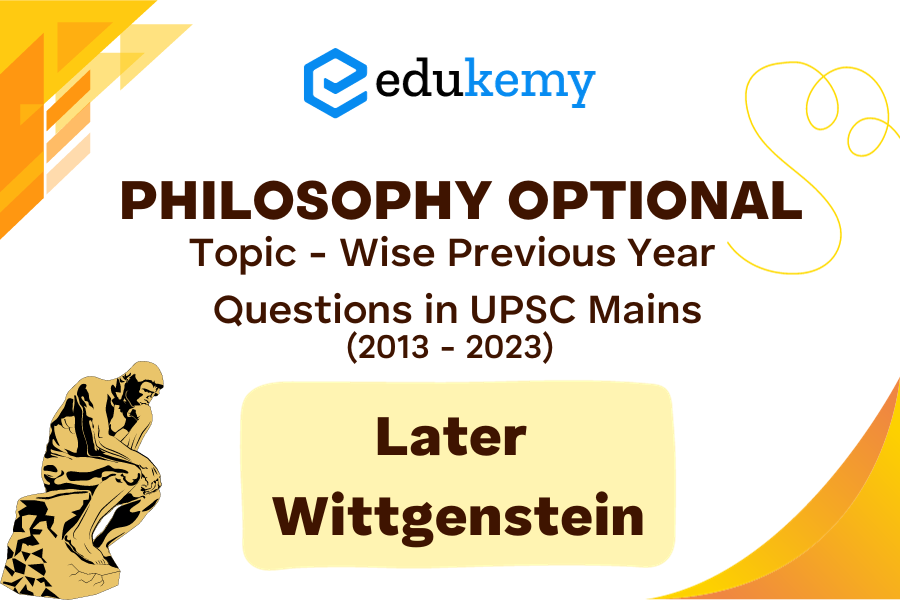
Are you an aspiring civil servant with a penchant for philosophy? If so, you’re likely familiar with the rigorous UPSC Mains examination and the optional subjects it offers. Among these, philosophy has always held a special place, attracting candidates who seek intellectual depth and a holistic understanding of life’s fundamental questions. In this blog series, we delve into the treasure trove of wisdom from past years, exploring the Later Wittgenstein section (2013-2023) of the UPSC Mains philosophy optional questions. This unique journey through the evolution of Wittgenstein’s philosophical thought not only serves as a testament to the depth and diversity of the subject but also offers valuable insights into the critical nuances that have challenged and inspired philosophers for generations. Join us as we embark on this intellectual expedition, analyzing the questions that have shaped the thinking of civil service aspirants and the very fabric of contemporary philosophical discourse.
Contents
- 1 Later Wittgenstein Philosophy – Previous Year Questions (UPSC CSE Mains History Optional)
- 2 FAQs on Later Wittgenstein
- 2.1 Q: What is lateral thinking, and how does it relate to Wittgenstein’s philosophy?
- 2.2 Q: What are some key quotes from Wittgenstein’s early philosophical writings?
- 2.3 Q: What are “language games” in Wittgenstein’s philosophy?
- 2.4 Q: Can you provide a summary of Wittgenstein’s philosophy in a nutshell?
- 2.5 Q: What are the main differences between early Wittgenstein and late Wittgenstein’s philosophies?
- 3 In case you still have your doubts, contact us on 9811333901.
Later Wittgenstein Philosophy – Previous Year Questions (UPSC CSE Mains History Optional)
1. Bring out the relationship between language games and forms of life.(2015/20)
2. Bring out the significance of ‘Language Games’ in Wittgenstein’s Use theory of meaning. (2014/10)
3. Explain Wittgenstein’s arguments against the possibility of private language.(2013/10)
4. According to Wittgenstein ‘Philosophy is a battle against be witchment of our intelligence by means of language’. Explain the function of philosophy in the above context.(2012/12)
5. “Meaning of the word lies in its use”. Explain in detail. (2011/30)
6. Are tautologies meaning according to Wittgenstein? (2010/15)
7. Wittgenstein’s notion of language-game. (2008/20)
FAQs on Later Wittgenstein
Q: What is lateral thinking, and how does it relate to Wittgenstein’s philosophy?
A: Lateral thinking is a term often associated with creativity and problem-solving. It encourages unconventional approaches to challenges. In the context of Wittgenstein’s philosophy, lateral thinking can involve exploring new perspectives on language and meaning, which were central to Wittgenstein’s work.
Q: What are some key quotes from Wittgenstein’s early philosophical writings?
A: Wittgenstein’s early work, primarily presented in his “Tractatus Logico-Philosophicus,” contains several influential quotes. Some of the most famous include “The limits of my language mean the limits of my world” and “What can be said at all can be said clearly, and what we cannot talk about, we must pass over in silence.”
Q: What are “language games” in Wittgenstein’s philosophy?
A: Wittgenstein introduced the concept of “language games” to emphasize the diverse ways language is used in different contexts. Language games are rule-governed activities that establish the meaning of words and expressions. They play a pivotal role in his later philosophy, emphasizing the importance of context in understanding language.
Q: Can you provide a summary of Wittgenstein’s philosophy in a nutshell?
A: Wittgenstein’s philosophy underwent significant evolution from his early to later works. In his early philosophy, he aimed to create a logically perfect language but later shifted his focus to the use of language in social contexts. In essence, his philosophy explores the relationship between language, thought, and reality.
Q: What are the main differences between early Wittgenstein and late Wittgenstein’s philosophies?
A: The distinction between early and late Wittgenstein is fundamental. Early Wittgenstein focused on the idea that language should mirror reality, while late Wittgenstein emphasized the practical, contextual, and social aspects of language. These shifts in focus represent a major transformation in his philosophical thinking, and understanding these differences is crucial for grasping the essence of his work.
In case you still have your doubts, contact us on 9811333901.
For UPSC Prelims Resources, Click here
For Daily Updates and Study Material:
Join our Telegram Channel – Edukemy for IAS
- 1. Learn through Videos – here
- 2. Be Exam Ready by Practicing Daily MCQs – here
- 3. Daily Newsletter – Get all your Current Affairs Covered – here
- 4. Mains Answer Writing Practice – here

